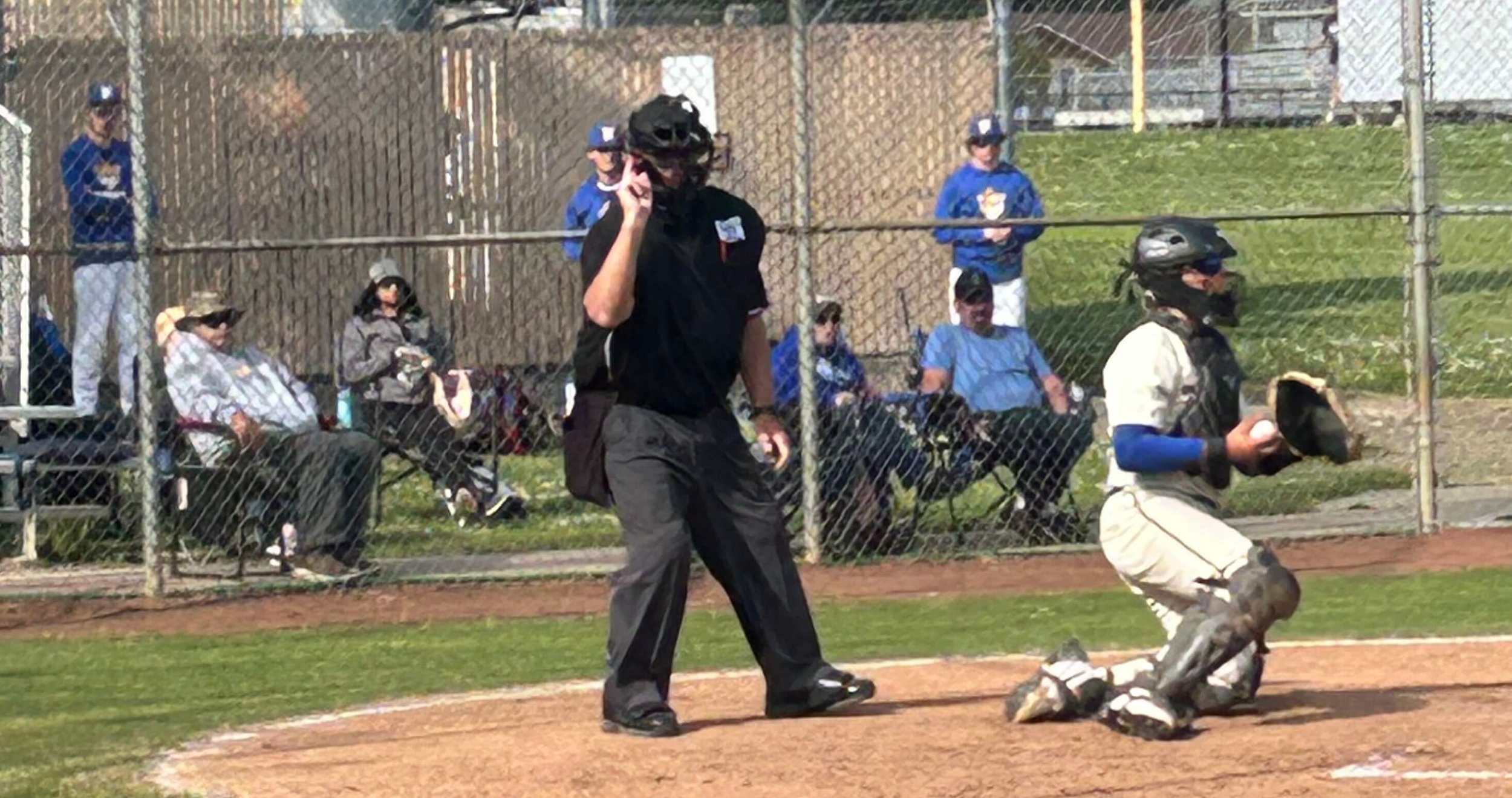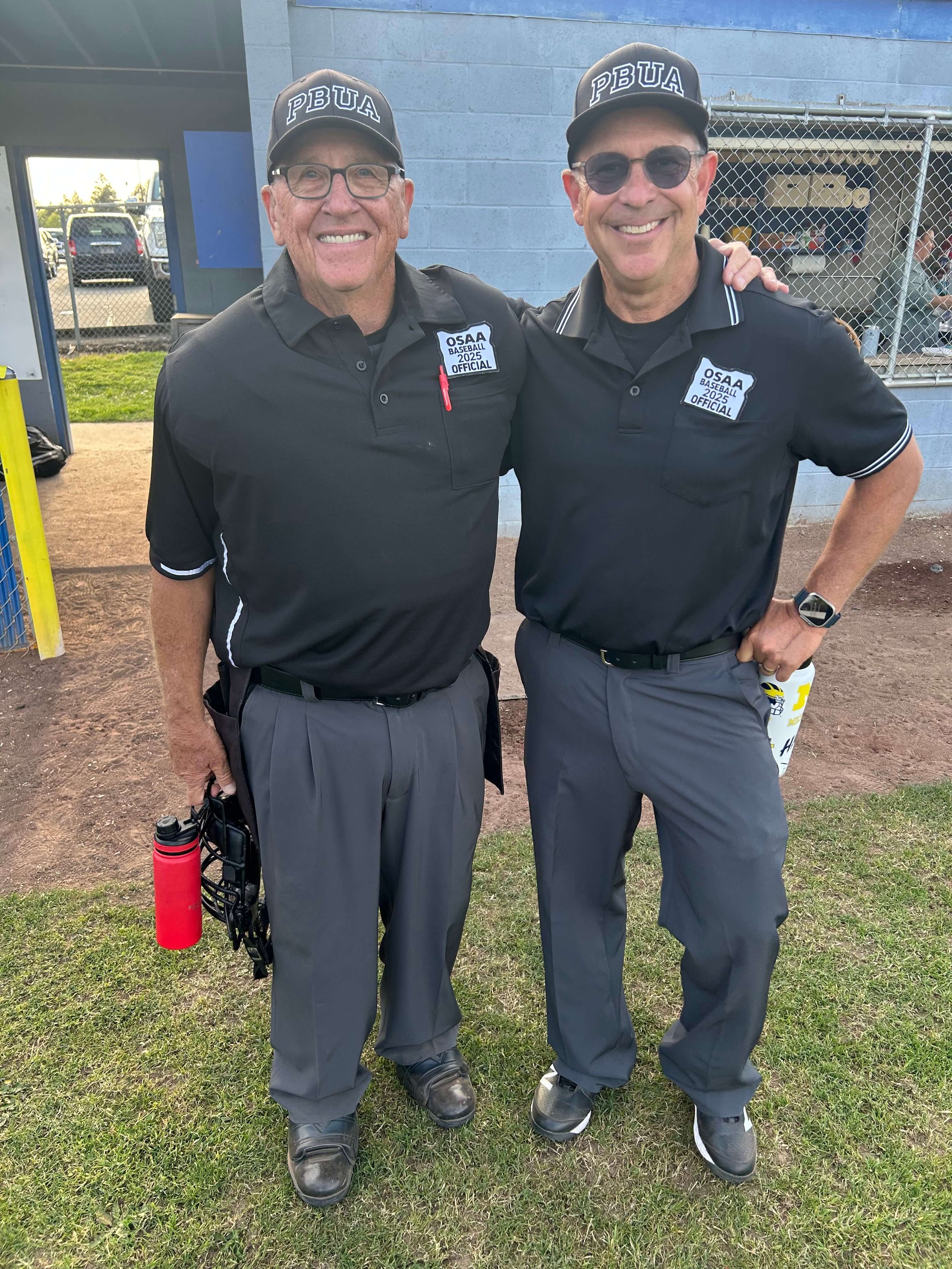Instead of talking on camera, Linnman now calls balls and strikes
Former Portland TV and radio personality Paul Linnman has a second “career” — as a high school baseball umpire
Updated 5/10/2025 5:36 PM
NEWBERG — Paul Linnman walks toward the visitors’ dugout, pulls off his umpire’s mask and smiles as he is greeted by a reporter and old friend.
Newberg has just beaten Sherwood 3-0 in a seven-inning high school junior varsity game that has been played in under two hours.
“In those kind of games you almost go to sleep out there,” Linnman says. “There was good pitching today, and if the kids threw strikes, the batters were going after them. It was the best of both worlds. Those kind of games, you tend to get a little complacent. You have to stay glued, stay with it and call the game to the end.”
That is exactly what Linnman has done on this day. At 78 years of age, at that.
You know Paul Linnman, or at least recognize the name, from his 30-plus years as a Portland TV and radio personality. The Wilson High grad was news reporter, host and anchor from 1967-72 at KATU, from 1978-83 at KGW and from 1983-2004 back at KATU. He hosted a radio talk show on KEX from 2003-14. From 1973-78, Linnman worked as executive assistant to City Commissioner Mildred Schwab.
After retirement in 2014 at age 67, Linnman spent more time at his Beaverton home with his wife, Vicki, played lots of golf, walked for exercise and maybe was a little bored.
Three years ago, Linnman decided he wanted to be an umpire. He went through the training program with the Portland Baseball Umpires Association and became certified. He is now in his third season working high school games in the Portland area.
“I do this because I love the game,” Linnman tells me. “But the real reason I got involved is because there is such an umpire shortage right now.”
Steve Weidmann, in his fourth year as commissioner of the PBUA, confirms Linnman’s assertion, thought the shortage isn’t as critical as it was a year ago. The PBUA provides umpires for about 1,600 high school games at five levels — 2A through 6A — throughout the Portland metropolitan area and beyond, covering 60 teams.
“We do Corbett to Sandy to Estacada, Wilsonville and Canby to Newberg, Banks and St. Helens, Gaston and Molalla (and all points in between),” Weidmann says. “This year, we are covering four schools for the Salem association because there is a shortage there. We also send a crew to Tillamook every week.
“To adequately cover that, we need between 150 and 160 umpires. We have about 140. This year, I have been able to avoid canceling any games, but there are a lot of times when we send only one official. He has to work the whole game from behind the plate. Even with two umpires, there is a lot of area to cover; it is doubly bad with one person. But it is better than having nobody.”
Into the fray walked Linnman, Wilson’s varsity catcher back in 1964 and ’65. Future major leaguer Wayne Twitchell was the Trojans’ ace pitcher during Paul’s junior year. Linnman also coached his four sons in youth baseball as they were growing up.
“High school ball was one of the happiest times of my life,” Linnman says. “You want other kids to have that experience. To know games haven’t been played because they can’t get officials tears me up.”
The PBUA training sessions are thorough.
“The OSAA has certain hoops they require you to jump through to be certified to umpire high school games in the state of Oregon,” Weidmann says. “It involves testing and on-going training, on-field work and a lot of homework.”
“It goes way deeper than you would think,” Linnman says. “I thought I knew baseball until I had to know the rules. The first year was a real challenge. Through the season, we meet on Monday nights and have classes and keep up to speed on everything. The instruction is all good. They want to make sure you are comfortable in any situation, and they get you there.”
Linnman seems to have found a groove. He had the plate during the Newberg-Sherwood game and worked it smoothly, with no confrontations from either side and little complaint from the Newberg home crowd. He works in business-like fashion, with no showboating on the strike calls. And he seemed to get a large majority of the calls right.
“He is very professional,” says Sherwood coach Mike Bernards, who had never had Linnman call a game of his before. “Good guy. We got along great.”
Working the bases with Linnman was Brian Leitgeb, who has known Linnman forever. This is Leitgeb’s first season umpiring high school games. It was the second time they have umpired together.
Paul Linnman (left) was one of Brian Leitgeb’s Little League coaches. Now they are calling games together in the Portland Baseball Umpires Association
“He was my Little League coach,” Leitgeb says. “I played with his son, Darin. Paul is great. He is an inspiration to me. For him to come out and do this for the community … he is doing this for the kids.
“We are both fortunate. Neither one of us is doing this to make a living. I have had three boys go through the system and play college baseball. Youth and high school baseball was great to my family. I coached for 20 years. This is the first year I haven’t been chasing baseball players. I am available, so I am here.
“Paul wanted to give back to the community. He is out here to help kids play the game he loves. We need that right now.”
When Linnman applied for the PBUA training, Weidmann knew the name right away.
“I went to high school in Portland,” he says. “I remember watching Paul on TV. It is exciting to have a celebrity working our games. I took a special interest in Paul. He is fantastic. He really enjoys it, and that is the key. He has so much fun out there. You can see it in his face, the way he interacts with the players and the coaches.
“It is great knowing him. He is a fun man, a nice person, and he goes out there and works really hard. He is a very solid umpire — varsity-quality. He worked his varsity game in only his second year of umpiring. After a game, he goes home and nobody remembers who umpired the game. That’s the way it’s supposed to be.”
So far, Linnman has called mostly JV games. Truth be told, he prefers it that way.
“I don’t know that I want to move up to varsity,” he says. “I like kids at this level. They are still hungry, and they try their hardest.”
That is fine with Weidmann.
“We need a lot more sub-varsity umpires,” he says, “than we need those who work the varsity level.”
I was impressed that, at 78, Linnman could handle the physical requirements of getting into the crouch with every pitch. Maybe it is because of his athletic background. When he was 40, he quit drinking alcohol and started running. He ran 12 marathons, including Boston. He wraps a knee that bothers him, but that is his only concession to physical limitations. Still, it is not easy.
“When you work the plate, you notice the muscles in your thighs,” he says. “You go to bed at night and think, ‘Oh yeah, I squatted 1,000 times today.’ ”
I asked Bernards if he knew how old Linnman is. He guessed “early 70’s.” When I told him, he smiled.
“That is amazing,” the Sherwood coach said. “First thing I did when we got out here was thank him. I told him, ‘That you are doing this for the kids is unbelievable. Good on you.’ ”
Linnman isn’t the oldest umpire working games in the PBUA. Dave Amato, 80, is a former baseball player at Central Catholic.
“We are best friends,” Linnman says. “We started umpiring together in 2023. We compare notes. We have worked one game together and have another one scheduled. He runs around like a little penguin.”
There are other old-timers working the PBUA. Mike Furey, 81, is the oldest. He has worked for the association for 51 years. Bruce Estes, 77, has the longest term of service — 55 years. Then there is Jim Klink, 77, working his second season.
In three years as an umpire, Linnman has sparked no rhubarbs. He has ejected no one. Not even close.
“I have not had one real argument,” he says. “I have not heard one negative comment from the crowd. That surprises me. When I played baseball, you kept the umpire honest with complaints now and then.
“The closest I came was when a coach questioned a call at third base. I called a kid safe; he thought he was out. The third baseman tagged the (runner), but his foot was on third base when he tagged him. The coach got a little excited and said the wrong thing to me. He said, ‘You need to give me one.’ And I said to him, ‘An umpire doesn’t need to give anyone anything. I am not going to talk about it anymore.’ ”
Linnman says coaches and players know not to question balls and strikes.
“Anything else is a judgment call,” he says. “If push comes to shove, you can say, ‘In my judgment, he was out, and I am the umpire.’ ”
There are two seasons for the PBUA. The high school campaign runs from March through the end of May, and there there is a summer season for American Legion and Northwest Prep Baseball Association that extends through the end of July. Umps are paid $67.50 for sub-varsity and $74.25 for varsity per game, plus a minimum $10 travel allowance.
“It works out to be about three hours of work,” Weidmann says. “(Umpires) are not doing it for the money. You do it because you love baseball, and you love watching kids play the game.”
Linnmann, who called “40-some games” in 2024 and expects to do about the same number this year, has signed up to work the summer schedule, too. But Weidmann honors the limitations on his commitment.
“I say Monday, Wednesday and Friday games, but no weekends if possible,” Linnman says. “And I don’t do double-headers.”
There is no question that Linnman is loving it.
“If more guys knew how much fun it is to be back in baseball, they would sign up for this,” he says. “Just to be back in baseball with these kids running around … I wish I had done it years ago.”
There are times when Vicki, his wife of 57 years, wishes so, too.
“She likes me to be active and busy,” Paul says with a grin. “Occasionally, if I am bugging her in the evening, she will say, ‘Don’t you have a game to umpire?’ ”
► ◄
Readers: what are your thoughts? I would love to hear them in the comments below. On the comments entry screen, only your name is required, your email address and website are optional, and may be left blank.
Follow me on X (formerly Twitter).
Like me on Facebook.
Find me on Instagram.


